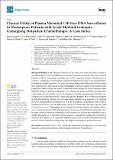Clinical Utility of Plasma Microbial Cell-Free DNA Surveillance in Neutropenic Patients with Acute Myeloid Leukemia Undergoing Outpatient Chemotherapy: A Case Series
Author(s)
Lampou, Maria; Trull, Elizabeth C.; Warren, Hailey M.; Ghebremichael, Musie S.; Nakka, Raja; Floyd, Daniel J.; Fathi, Amir T.; Brunner, Andrew M.; Mansour, Michael K.; ... Show more Show less
Downloaddiagnostics-15-01715-v2.pdf (812.1Kb)
Publisher with Creative Commons License
Publisher with Creative Commons License
Creative Commons Attribution
Terms of use
Metadata
Show full item recordAbstract
Background/Objectives: The main objective of the study is to assess the clinical utility of microbial cell-free DNA (mcfDNA) in neutropenic patients diagnosed with acute myeloid leukemia (AML) undergoing chemotherapy in the outpatient setting. Neutropenia is a common complication in this patient cohort and enhances the risk of fatal opportunistic bacterial and fungal infections. Accurate and timely diagnosis of these infections in outpatient asymptomatic individuals is critical. Methods: Fourteen patients were studied in this prospective observational case series. Traditional blood cultures (BCs) were obtained when clinically indicated and blood samples were collected for plasma mcfDNA metagenomic sequencing up to two times a week at outpatient oncology appointments. Results were compared in identifying potential infectious agents. Results: BCs identified pathogens in only two patients, despite several cases where infection was suspected. In contrast, mcfDNA testing detected pathogens in 11 of the 14 patients, including bacteria, such as Staphylococcus aureus, and invasive fungi, such as Candida and Aspergillus species, and Pneumocystis jirovecii. Conclusions: In the outpatient setting, mcfDNA surveillance offers a more reliable method for detecting pathogens. This approach identified actionable microbiologic results in immunocompromised individuals who did not meet standard clinical criteria for suspicion of infection. Further research is required to confirm the potential of mcfDNA surveillance in an outpatient setting to guide more accurate treatment decisions, reduce extensive clinical investigations, and improve neutropenic patient outcomes.
Date issued
2025-07-05Department
Ragon Institute of MGH, MIT and HarvardJournal
Diagnostics
Publisher
Multidisciplinary Digital Publishing Institute
Citation
Lampou, M.; Trull, E.C.; Warren, H.M.; Ghebremichael, M.S.; Nakka, R.; Floyd, D.J.; Fathi, A.T.; Brunner, A.M.; Mansour, M.K. Clinical Utility of Plasma Microbial Cell-Free DNA Surveillance in Neutropenic Patients with Acute Myeloid Leukemia Undergoing Outpatient Chemotherapy: A Case Series. Diagnostics 2025, 15, 1715.
Version: Final published version